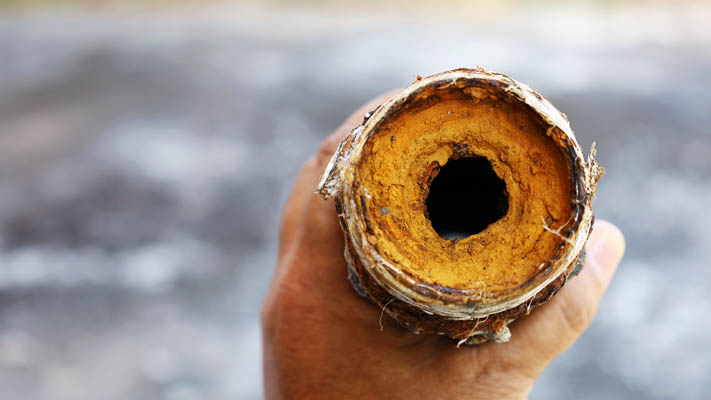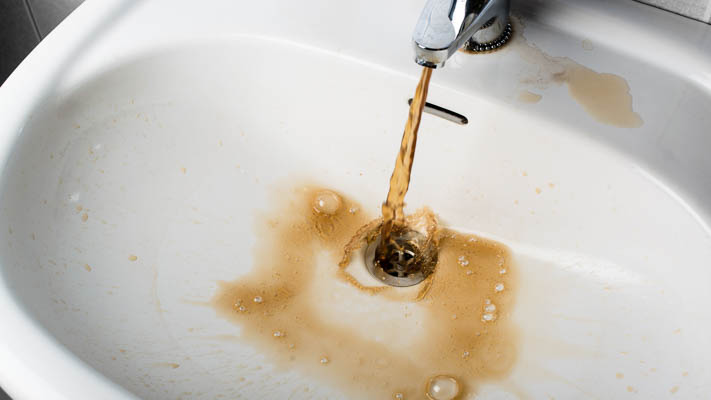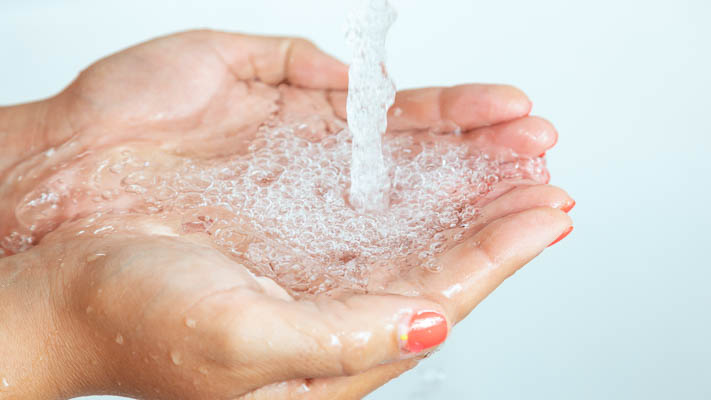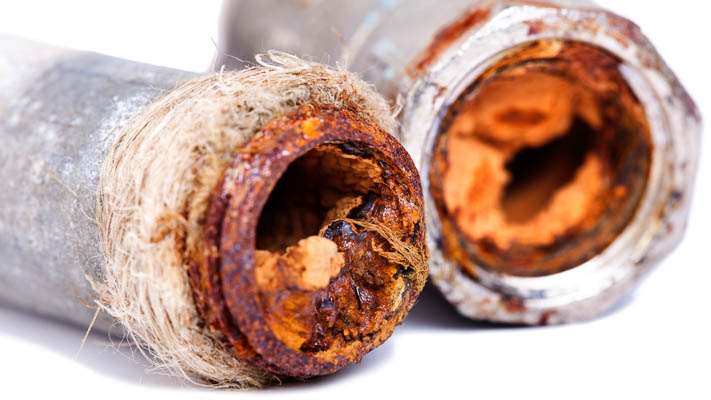What Is Galvanized Steel Plumbing?
Galvanized plumbing is steel pipes and fittings coated with zinc, through a process called galvanization. The zinc acts as a protective layer that is intended to prevent the steel (or iron) from rusting.
When the zinc coating eventually wears off, the underlying steel (or iron) will become exposed to oxygen and chemicals in the water, and start to rust and corrode. Unless galvanized pipes are located in a damp area, the pipe exterior may be in very good condition, even though the interior is heavily corroded and rusty.
Galvanized plumbing was very common in the United States, up to about 1960, when it was gradually phased out as a preferred plumbing material and replaced by copper piping or various types of plastic tubing (PEX, CPVC, Polybutylene).
Get your free estimate today
With over 75,000 repipes completed, we've perfected our One-Stop Repipe™ for your home.
Why Was Galvanized Steel Used for Water Pipes?
Galvanized steel pipes started to replace lead pipes as a preferred material in fresh water plumbing systems in the early 1920's and 30's as awareness increased about the health hazards of lead pipes.
Previously, lead had been the most common material used for fresh water plumbing. As lead was phased out in new construction and pipe replacement, the two main alternative materials became copper tubing or galvanized steel pipes.
Galvanized pipe was much more commonly used as it was less expensive, more durable, and easier to install and work with compared to the copper tubing available at the time.
How Long Does Galvanized Water Piping Last?
The working lifespan of galvanized pipe systems vary significantly, from anywhere between 30 to 70+ years.

Any galvanized steel pipes used for residential hot and cold water plumbing are likely to be at least 40 years old, if not many decades older. They will almost certainly have reached the end of their expected service life and started to corrode significantly on the inside.
Key factors affecting how long galvanized pipes last:
- Quality and thickness of zinc coating on pipes and fittings.
- The quality of the initial installation & any subsequent repairs.
- Chemistry of the municipal (or well) water supply.
- Hot vs cold supply lines: hot water has more oxygen, and will corrode steel faster.
- Pipes located in a damp environment (for example, running under a home in a raised foundation) can have significant corrosion on the outside of the pipes and around fittings.
For more information, we have a detailed article on the key factors affecting how long galvanized pipes last for.
What Are Common Problems Caused by Old Galvanized Piping?

Signs of internal galvanized plumbing corrosion:
- Rusty and discolored water: as rust and scale in the piping flakes off, you can often get rusty colored water (or rusty tasting water) at your water outlets.
- Low or unequal water pressure: the internal rust and scale will build up and can significantly restrict water flow. The restricted flow will be most noticeable on hot water outlets, and outlets furthest from the supply.
- Water leaks: corrosion can become serious enough, that pipes and connections start to fail. Sometimes these leaks can be slow, and go undetected for long periods, resulting in build up of mold in wall cavities (requiring expensive and disruptive mold remediation when discovered). There are several ways to help detect water leaks in your home.
How To Identify Galvanized Plumbing
Since galvanized piping has been around for so long, it is common that older homes have a mix of plumbing materials. As remodels, extensions, and/or repairs are performed - older galvanized pipe is often replaced with newer copper or plastic piping.
Of the various plumbing materials used, only galvanized steel and cast iron (often used on drain and vent piping) are magnetic. Lead and copper are not magnetic, and of course neither is any plastic tubing. If a strong magnet sticks, and it is a water supply line: you are looking at galvanized steel piping.
You can also perform a scratch test on any of the three possible metal pipes. Using a screwdriver:
- Lead: scratches will reveal a shiny silvery gray.
- Copper: scratches will reveal a shiny copper color - like a new penny.
- Galvanized Steel: If the exterior is rusty, it should reveal a dull gray when scratching off the rust. If the exterior is gray- it will remain dull gray.
Should I Replace My Galvanized Pipe With PEX Tubing?
If you want fast-flowing, clean water without leaks from corroded galvanized pipes, you need to replace them with a modern plumbing system, such as PEX tubing or copper pipes.

Some homeowners opt for partial repiping and repairs instead of a full home replumb of galvanized pipes. Here at Repipe Specialists, we believe this is a short-term solution that will cost you more in the long run.
All galvanized pipes will eventually need replacement, and doing it piecemeal over time will be far more expensive than replacing them all at once. Additionally, a single leak could cause more water damage than the cost of a complete repipe.
Most of our repipes are priced between $4,500 for a smaller home, and up to $15,000 for larger more complex projects. You can read more about this in our article: How Much Should A Repipe Cost. We also offer repipe financing options to take the sting out of unplanned repipe expenses.
Most galvanized plumbing repipes are now done with either PEX tubing or copper piping (we offer lifetime warranties for copper repipes and PEX repipes). PEX pipes are the most commonly chosen option by our customers.
A Repipe Specialists local repipe consultant would be happy to explain all your options, either in person or in a remote consult session. Schedule a free repipe quote.
Get a Quote for Repiping Your Galvanized Plumbing
Here at Repipe Specialists, we've fully replaced galvanized plumbing in thousands of homes since 1991 using both copper piping and PEX tubing. We continually get positive customer feedback from customers about their overall home repipe experiences. We often exceed their expectations on:
- Speed: Our repipe crews typically complete a repipe in a day, returning on another day for wall patching.
- Convenience: Through our One-Stop Repipe™ process, we handle everything from permits, to wall patching, to inspections.
- Cleanliness: Our crews are trained to protect your home while working (we cover all surfaces with protective sheeting), and to clean up fully at the end of each day.
- Peace of Mind: Repipe Specialists is a fully licensed plumber in every state we operate in, and we back all of our repipes with a lifetime warranty.
- Financing programs: To help take the sting out of unplanned repipe expenses, we offer several financing programs.
- Price: As a specialist that performs hundreds of repipes a week, we can deliver high-quality repipes at a lower cost vs generalist plumbers. We have an article that covers repipe cost factors in detail. Our quotes typically range from $4,500 to $15,000 depending on the size and complexity of your project.
Schedule a free in-home consult, and one of our local repipe consultants will explain all your repipe options and provide you with a written, fixed-price quote. Replace galvanized pipes to ensure the longevity of your home's plumbing.

